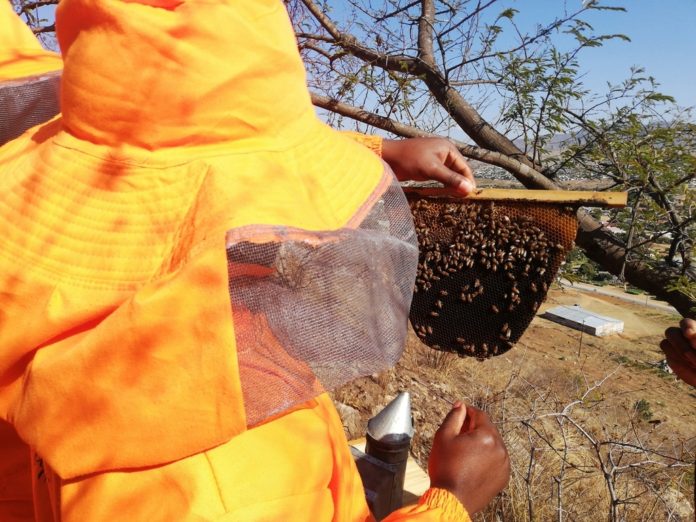Mutare, Zimbabwe — Growing up in Ngaone, Chipinge in the southeastern town of Zimbabwe, Ishmael Sithole (35) still recalls bees could not entertain anyone cutting down a tree near their hives.
He hated them for their stinging bite.
Then, he was a young boy, growing up in a family that grew wattle trees for survival.
He never imagined the idea of becoming a beekeeper someday, nor did he know the value of bees to conserving forests.
Only God knew his fate.
Sithole, is now a renowned professional beekeeper and commercial beekeeping consultant at MacJohnson Apiaries.
He works with Willett Mtisi (44) of Climate Smart Bees and Admire Munjuwanjuwa (35) of Honey World Zimbabwe.
Sithole nostalgic about his childhood and others determined to change the lives of their communities, the three have expanded the project to Dangamvura, a high-density suburb in Mutare—Zimbabwe’s fourth-largest city.
Their project has become a shield to the effects of deforestation.
In this area, trees have been cut down except where these beekeepers’ beehives are located and surrounding areas.
“If you try to cut down these Acacia trees, bees will come out to defend their territory,” Sithole told Ubuntu Times while applying few puffs of smoke at one of the bee hive’s entrance.

“Bees have a high sense of smell. They naturally feel threatened whenever they hear the sound of an axe chopping a tree within a 10-meter radius. They become defensive and go into a stinging frenzy.”
When there is an intruder bees have a natural chemical that they produce known as pheromone, that triggers the colony to be defensive.
Sithole, a member of the Southern African Development Community Apimondia Youth Initiative, said their bee sanctuary in Dangamvura, established two years ago, is serving a dual purpose-producing honey and keeping firewood poachers at bay.

He adds that there is a symbiotic relationship between the urban environment and bees.
“This then offers an opportunity for biodiversity conservation as well as an opportunity for apitourism—where the public are afforded an opportunity to appreciate bees at sanctuary setting,” Sithole said.
The trio rescue bees in urban areas from ceilings, chimneys and tree hollows, and house them in the mountains.

“We are currently hosting approximately 24,000 bees of the Apis Mellifera species in three standard Kenyan top bar hives. We will be introducing the trigona hives to attract the trigona species,” Sithole said.
At the sanctuary, they were mainly targeting to protect Acacia trees.
“Acacia trees are a lucrative source of nectar and pollen yet they offer immaculate shade for hives as well as a beautiful aesthetic appeal owing to their shape,” he said.
Sithole said they are determined to leave an indelible mark in the annals of the forest conservation to last hundreds of years to come.
“Since the tree of this year is Adansonia digitata (Baobab), we are busy erecting a nursery so that we plant hundreds of this largest succulent on the first Saturday of December (the National Tree Planting Day) as well as on the 11th of December (International Day of Mountains). Some of the trees we are nursing will be visible and alive 700 years to come,” he said.
Albert Sabawe (24), another beekeeper based in Chimanimani, about 144 kilometers out of Mutare, told Ubuntu Times that bees protect forests.
“No one dares to cut down a tree near my beehives,” he said.
Mtisi said honey which will be harvested at the bee sanctuary in Dangamvura will be an additional bonus.
“Honey builds bodily resistance to cough, colds and other ailments. Provides cure for constipation and it is used in Hospitals as a surgical dressing. Asthmatic patients also benefit from honey as well as people with ulcers,” she said.

Zimbabwe’s beekeeping industry has been growing for the past decade.
“As beekeepers, we champion forestry preservation by protecting our sites through establishing fireguards in areas where we keep our bees,” said Jacqueline Gowe, a chairperson at the Zimbabwe Apiculture Platform (ZAP).
“We promote use of modern hives made from timber of environmentally managed forests.”
According to the country situation paper, in 2014 there were over 150,000 beekeepers in the country but projections from the ZAP are that the number has almost doubled up.
The trio are expanding their project to other areas.
“We recently introduced another sanctuary close to Cecil Kop [a nature reserve located 2 kilometers out of Mutare] and we are prospecting for further expansions,” said Sithole.
Zimbabwe is experiencing its worst economic crisis in decades with shortages of basic commodities such as fuel and electricity.
Daily load shedding has become normal.
This has forced many people to cut down trees indiscriminately.

The southern African nation loses 330,000 hectares of forests per annum due to forest fires, settlements or agricultural expansion, firewood and tobacco farmers who burn their produce after harvests, according to the Forestry Commission.
But bee projects are helping to preserve forests and are fast becoming a lucrative enterprise.

Violet Makoto, an information and communications manager at the Forestry Commission said beekeeping is a forests-based enterprise that is lucrative and conservative.
“We have also discovered that beekeeping is one of the strategies for forest conservation,” she said.
Makoto concluded that beekeeping is a non-consumptive way of utilizing forest resources.

